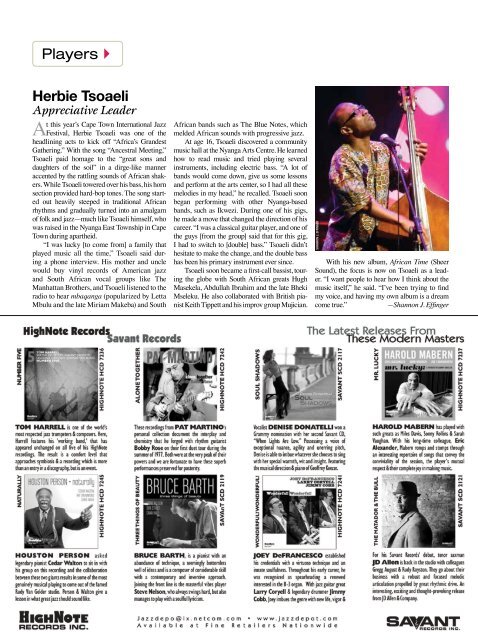Ron Carter Esperanza Spalding - Downbeat
Ron Carter Esperanza Spalding - Downbeat
Ron Carter Esperanza Spalding - Downbeat
You also want an ePaper? Increase the reach of your titles
YUMPU automatically turns print PDFs into web optimized ePapers that Google loves.
Players <br />
Herbie Tsoaeli<br />
Appreciative Leader<br />
At this year’s Cape Town International Jazz<br />
Festival, Herbie Tsoaeli was one of the<br />
headlining acts to kick off “Africa’s Grandest<br />
Gathering.” With the song “Ancestral Meeting,”<br />
Tsoaeli paid homage to the “great sons and<br />
daughters of the soil” in a dirge-like manner<br />
accented by the rattling sounds of African shakers.<br />
While Tsoaeli towered over his bass, his horn<br />
section provided hard-bop tones. The song started<br />
out heavily steeped in traditional African<br />
rhythms and gradually turned into an amalgam<br />
of folk and jazz—much like Tsoaeli himself, who<br />
was raised in the Nyanga East Township in Cape<br />
Town during apartheid.<br />
“I was lucky [to come from] a family that<br />
played music all the time,” Tsoaeli said during<br />
a phone interview. His mother and uncle<br />
would buy vinyl records of American jazz<br />
and South African vocal groups like The<br />
Manhattan Brothers, and Tsoaeli listened to the<br />
radio to hear mbaqanga (popularized by Letta<br />
Mbulu and the late Miriam Makeba) and South<br />
African bands such as The Blue Notes, which<br />
melded African sounds with progressive jazz.<br />
At age 16, Tsoaeli discovered a community<br />
music hall at the Nyanga Arts Centre. He learned<br />
how to read music and tried playing several<br />
instruments, including electric bass. “A lot of<br />
bands would come down, give us some lessons<br />
and perform at the arts center, so I had all these<br />
melodies in my head,” he recalled. Tsoaeli soon<br />
began performing with other Nyanga-based<br />
bands, such as Ikwezi. During one of his gigs,<br />
he made a move that changed the direction of his<br />
career. “I was a classical guitar player, and one of<br />
the guys [from the group] said that for this gig,<br />
I had to switch to [double] bass.” Tsoaeli didn’t<br />
hesitate to make the change, and the double bass<br />
has been his primary instrument ever since.<br />
Tsoaeli soon became a first-call bassist, touring<br />
the globe with South African greats Hugh<br />
Masekela, Abdullah Ibrahim and the late Bheki<br />
Mseleku. He also collaborated with British pianist<br />
Keith Tippett and his improv group Mujician.<br />
shannon j. effinger<br />
With his new album, African Time (Sheer<br />
Sound), the focus is now on Tsoaeli as a leader.<br />
“I want people to hear how I think about the<br />
music itself,” he said. “I’ve been trying to find<br />
my voice, and having my own album is a dream<br />
come true.” —Shannon J. Effinger<br />
credit
















